The content displayed below is for educational and archival purposes only.
Unless stated otherwise, content is © Watch Tower Bible and Tract Society of Pennsylvania
You may be able to find the original on wol.jw.org
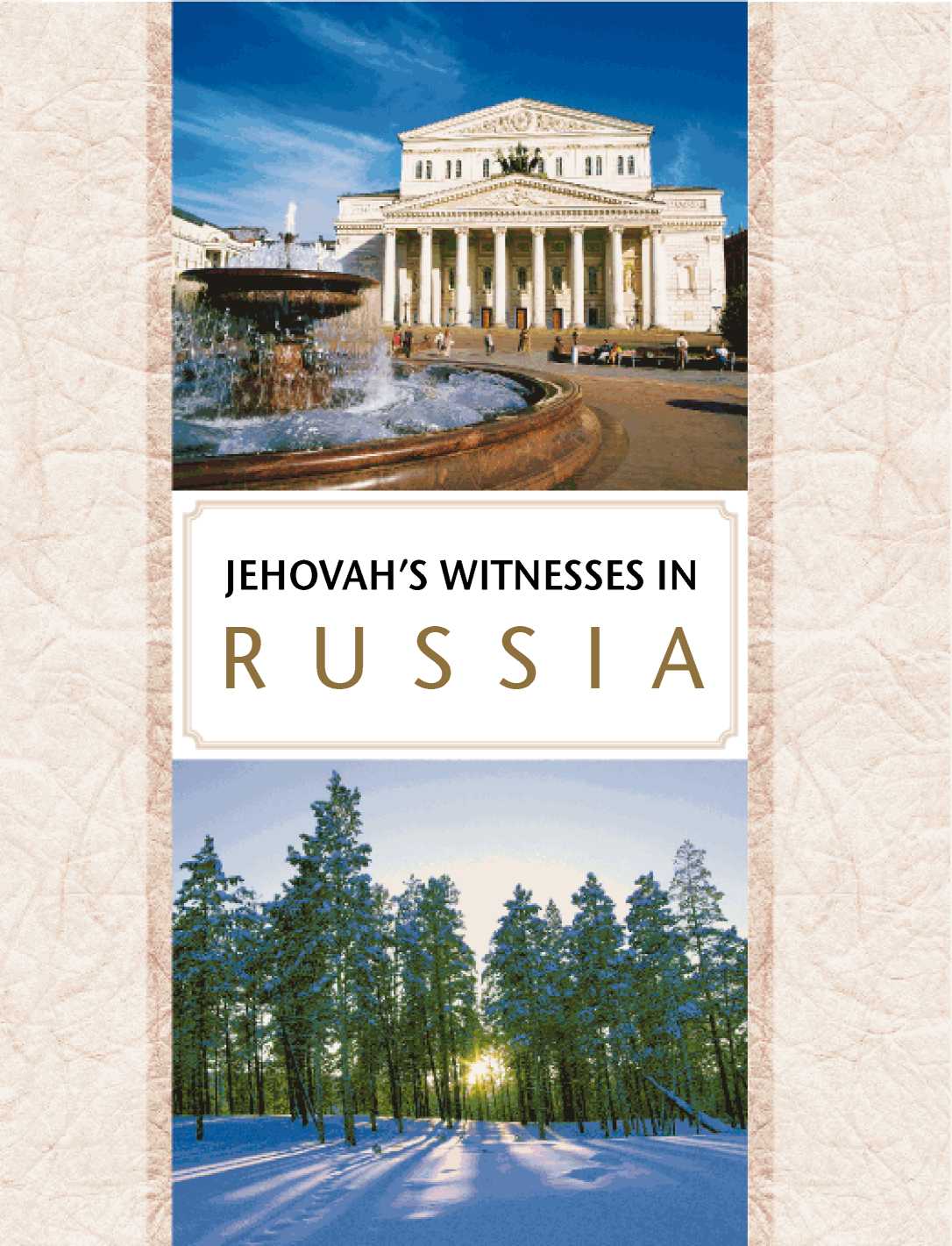
JEHOVAH’S WITNESSES IN
RUSSIA
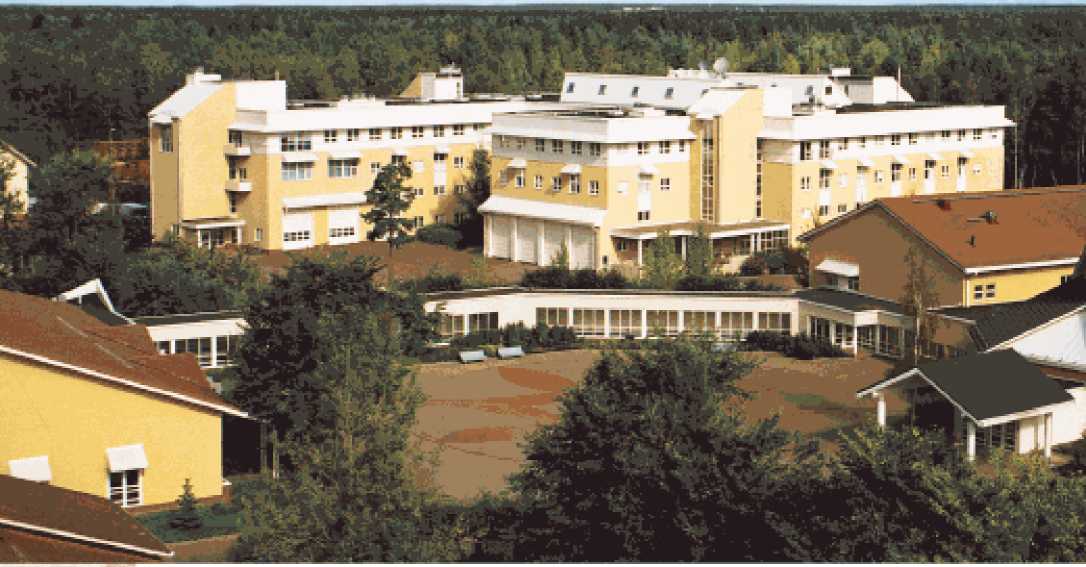
JEHOVAH’S WITNESSES
Who Are They?
JEHOVAH’S WITNESSES sincerely desire that you become better acquainted with them. You may have met them as neighbors, fellow employees, or schoolmates. Perhaps you have been greeted by them on the street while they were talking with people about the Bible. Or you may have enjoyed their personal visit at your home.
Jehovah’s Witnesses are Christians. They have been present in Russia for more than a century. Their worship in Russia can be dated to the time of the czars. The Witnesses experienced persecution during the Soviet era. Today they worship in over 2,200 congregations and groups throughout Russia.
Jehovah’s Witnesses in Russia are part of a worldwide brotherhood, an international Christian religious organization active in
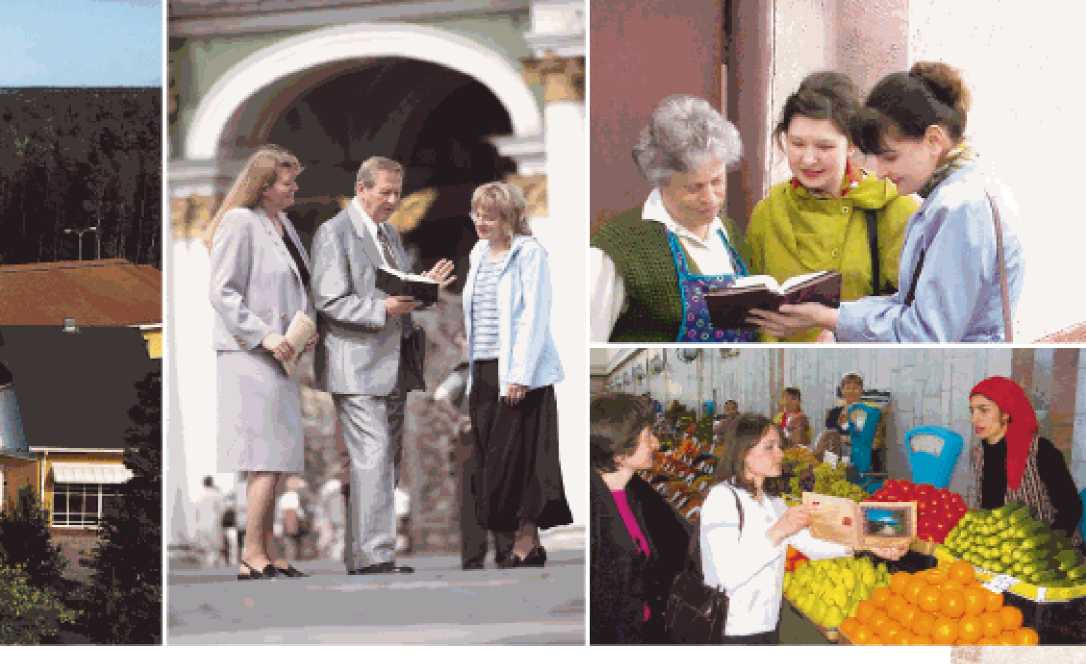
more than 230 lands and island groups. Jehovah’s Witnesses are legally recognized in the countries of the European Union, and in many of them, the Witnesses enjoy the same privileges as other major religions. In Italy and Spain, Jehovah’s Witnesses are the second-largest religion. In Germany they have over 2,200 congregations and are protected by a legal status given only to recognized major religions. They have a similar status in Hungary. There are over 7,000,000 of Jehovah’s Witnesses worldwide, and among them Russian is the fifth-largest language group after Spanish, English, Portuguese, and French.
Jehovah’s Witnesses face the same economic, physical, and emotional problems as everyone else. In all their activities, they seek guidance from the Holy Bible, and they try to be exemplary in Christian conduct not just with fellow Witnesses but also with friends, neighbors, and relatives. Being imperfect, they do not always succeed. Yet, it is the desire of their hearts to do good to all people and to extend a helping hand whenever possible.
The Witnesses believe that the entire Bible, which includes what are commonly called the Old Testament as well as the New Testament, is God’s Word. (1 Thessalonians 2:13) When it comes to teachings offered as Bible truth, they encourage people to follow the course of some of the inhabitants of Beroea in ancient Macedonia, who heard the apostle Paul preach. The historical account relates that “they received the word with the greatest eagerness of mind, carefully examining the Scriptures daily as to whether these things were so.”—Acts 17:11.
Their Name—Jehovah’s Witnesses
The name, Jehovah’s Witnesses, is descriptive. It is based on the statement at chapter 43, verse 10, of the Bible book of Isaiah, which says: “ ‘You are my witnesses,’ is the utterance of Jehovah.” Since all of Jehovah’s Witnesses have dedicated their lives to God, they bear witness concerning his name, his Godship, and his purposes.
A careful reading of the Bible, will show you that Jehovah is the personal name of Almighty God, the Creator of the universe. In the Synodal translation of the Russian Bible, Exodus 15:3 says about God: “Jehovah is His name.” (See also Exodus 33:19.) The name Jehovah appears several thousand times in the Hebrew Scriptures of the Bible, which were
Exodus 33:19 in the Synodal Bible where the divine name appears (circled in red)

ir.ir y bcB r :u l n np««-
■S(n i ■orn-Ifiiit.T nm QiTTiirn) nwn iflOfinc; i, | -t rtnuLnwnx [rtMiytr., UM nn-
U Duron j 1 .nint limn up iiiixim
HuTOM,* ':iv j Hll.l.tl b M- ll I, II ..“ TUlhr> II tiwrE IWiio.v: ton 21 crant. ua ■ Lull । ei.ii.
ukm M h'.l pujli.llllb itfli pyun Hum.
Ilpon.ir. Ii ■ .LA <dUMJ SJ lu yiiniuiiiL 'Ii uq run.i, ■Bf rynm hh iuu
T .1A B 1 It.
I. I'OCJIOJI MlIBCW. Ill- ] t&Ct ,IKt ILJ'IIX.LJII R-V npeaHikt, ii Illi Ba h jiyl. h 11 iinrn-ry translated into Russian in the first half of the 19th century by Orthodox priest Archimandrite Makarios. The 1825 Russian Bible Society Octateuch, edited by Gerasim Pavsky, contains the name Jehovah over 700 times.
“God,” “Lord,” and “Creator”—like “president,” “king,” and “general”—are titles. Titles are neither personal nor distinctive. However, the name Jehovah identifies the true God as a real Person.
Hence, some 7,000,000 of Jehovah’s Witnesses in over 230 lands are today telling the good news of God’s heavenly Kingdom by his Son, Christ Jesus, and they are using God’s name regularly in their worship.
Jehovah’s Witnesses use the form “Jehovah,” which people have been familiar with for centuries. In the foreword to his translation, Professor I. Maksimovich writes that the name “Jehovah ... is preserved in the Russian translation in every place it is found in the Hebrew text because the word [Ky'ri-os], which replaces it everywhere in the LXX [Septuagint], and the Slavonic word for ‘Lord’ do not at all express the meaning contained in the Hebrew word ‘Jehovah.’ "—Kings and Chronicles, Tsarstva, Paralipomenon, Kiev, 1860.
God’s name has been in use throughout history, even down to this day. It is noteworthy that God’s name, written in the Hebrew letters of the Bible (the Tetragrammaton), is a part of the decoration of many religious buildings, indicating that it is not a new term but, rather, a well-established name.
The History of Jehovah’s Witnesses in Russia
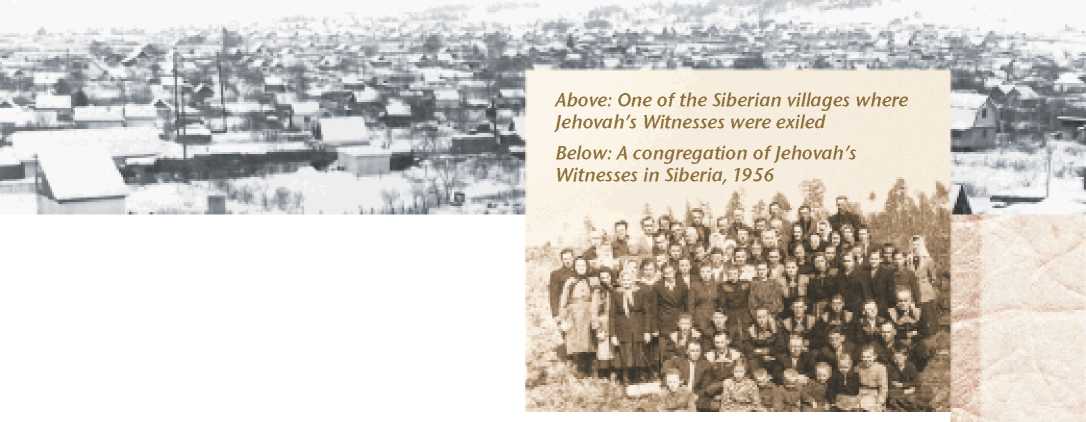
Above: One of the Siberian villages where Jehovah’s Witnesses were exiled
Below: A congregation of Jehovah’s Witnesses in Siberia, 1956
The modern-day history of Jehovah’s Witnesses in Russia began more than one hundred years ago. By 1887 the Watch Tower magazine was being read in Russia. In 1891, Charles Taze Russell—who was taking the lead in the work of the Bible Students, as Jehovah’s Witnesses were then known—made a
trip to Russia and met with people who were interested in Bible truths.
At about the same time, Semyon Kozlitsky, a graduate of a Russian theological seminary, got acquainted with the teachings of the Bible Students. He zealously sought to bring the good news of the Bible to those who were searching for it. In 1891 he was exiled to Siberia for allegedly insulting the archbishop of Moscow.
In 1904 a letter from a small group of Bible Students in Russia reported that they had received Bible literature, though not without difficulty. The group was so grateful to receive the literature that they said, “It is like gold here—it is so difficult to obtain.”
Writing after the 1917 revolution, one Bible Student painted this dreary picture: “You are probably aware of the situation here in Russia. We have a Soviet government based on Communist principles. While it is true that one can note the well-known push in the direction of justice, everything to do with God is being jettisoned.”
“Send Me a Little Bit of Everything”
During that same time period after the revolution, the headquarters of Jehovah’s Witnesses received a letter from a schoolteacher in Siberia who was searching for Bible truth. He wrote: ‘Here in Russia publications that enlighten are very much needed.’ He concluded the letter with a request for more literature, writing, “Please, send me a little bit of everything.”
As a result of those early beginnings, small Bible study groups and congregations of Bible Students were formed in various parts of Russia and other territories of the Soviet Union. In 1928 a representative of the headquarters of Jehovah’s Witnesses
visited Moscow in order to obtain permission to have Bible literature shipped into the country. Permission was granted to print 15,000 copies of the booklets Freedom for the Peoples and Where Are the Dead?
Witnesses in Prison
A number of Russian citizens, along with millions of people of other nationalities, endured great suffering in concentration camps located throughout the territories under Germany’s cruel totalitarian regime. According to historians, some 12,000 of Jehovah’s Witnesses were imprisoned—about a third of them in concentration camps. Hundreds received death sentences and were executed. Many prisoners met Jehovah’s Witnesses in concentration camps and then became Witnesses themselves.
In the Ravensbruck camp, 300 Russians became Jehovah’s Witnesses, and in another camp, 227. When released after the war, all of them carried their newfound faith back with them into the vast territory of the Soviet Union.
Enduring Under Persecution
In spite of persecution, more than 8,600 regularly attended the meetings of Jehovah’s Witnesses in the Soviet Union in 1946. In 1956 more than 17,000 people in the Soviet Union regularly worshipped with Jehovah’s Witnesses at their meetings.
Jehovah’s Witnesses in the Soviet Union were especially persecuted in the years 1949 and 1951. Many of them were exiled to Siberia and the Far East. What, though, was the outcome? Walter Kolarz, in his book Religion in the Soviet Union, writes: “This was not the end of the ‘Witnesses’ in Russia, but only the beginning of a new chapter in their proselytising activities.... In deporting them the Soviet Government could have done nothing better for the dissemination of their faith.” Yes, as a result of being exiled, Jehovah’s Witnesses flourished beyond the Urals, in Kazakhstan, Siberia, the Far East, and even on Sakhalin and Kamchatka.
During these trialsome years, Jehovah’s Witnesses were looking forward to the time when they could freely worship God in their own country. They tried fearlessly again and again to receive legal recognition. For example, on June 9, 1949, Jehovah’s Witnesses, acting on behalf of their fellow believers in all the territory of the Soviet Union, addressed a petition to the Ministry of the Interior of the U.S.S.R. in Moscow. On August 16, 1949, a delegation of Jehovah’s Witnesses in Moscow personally submitted a copy of this petition to the vice-chairman of the Presidium of the Supreme Council of the USSR.
Throughout the world at 199 conventions of Jehovah’s Witnesses held from June 1956 to February 1957, 462,936 delegates unanimously adopted a petition, copies of which were sent to the Council of Ministers of the Soviet Union in Moscow. Among other things, the petition stated: “There are witnesses of Jehovah kept in more than fifty camps from European Russia into Siberia and northward to the Arctic Ocean, even on the Arctic island of Novaya Zemlya.... In America and other western lands, Jehovah’s witnesses have been called ‘communists’ and in countries under communist rule ‘imperialists’ . . . Communist governments have accused and tried them as ‘imperialistic spies’ and have sentenced them to as many as twenty
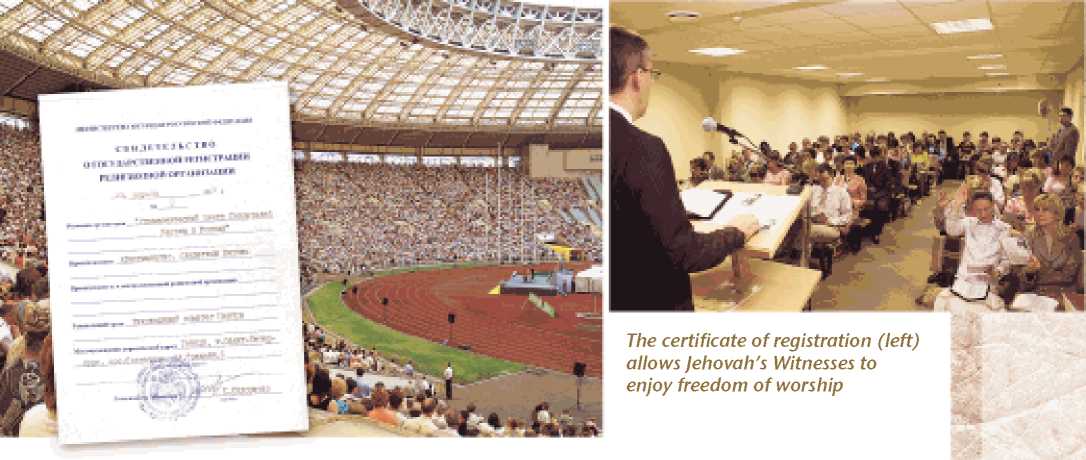
The certificate of registration (left) allows Jehovah’s Witnesses to enjoy freedom of worship
ty years in prison. But never have they engaged in any subversive activity.”
Freedom at Last!
By the end of the 1980’s, a new period began for Jehovah’s Witnesses in the territory of the Soviet Union—an era of freedom of worship. In 1989 and 1990, when the government authorities stopped viewing them as enemies, thousands of Witnesses were given the opportunity to go to Poland for their first Bible educational convention. Millions of their fellow believers around the world watched with keen interest and anticipation and wondered, ‘When will Jehovah’s Witnesses be legally recognized in Russia?’
Soon it happened. On March 27, 1991, the “Religious Organization of Jehovah’s Witnesses in the USSR” was registered. Shortly after the breakup of the Soviet Union, Jehovah’s Witnesses were registered in the Russian Federation on December 11, 1992. Following the first legal registration, a series of conventions was held in different cities throughout Russia and neighboring territories.
On March 14, 1996, Jehovah’s Witnesses were fully exonerated by a Russian Federation Presidential Decree (No. 378) as victims of political repression.
In 1999, the religious organization “Administrative Center of Jehovah’s Witnesses in Russia” was reregistered under the current religious law.
What Is Happening Today?
Today Jehovah’s Witnesses in Russia enjoy their freedom of worship. Currently, there are over 2,200 congregations and groups as well as more than 400 legally registered local religious organizations of Jehovah’s Witnesses in Russia. More than 118,000 free courses in Bible education are being conducted regularly with interested people right in their own home. In the early part of 2008, nearly 300,000 people were present at the annual commemoration of the Memorial of Christ’s death.
Jehovah’s Witnesses are motivated by genuine Christian love of neighbor. The Witnesses hope that others in Russia will listen to their message of good news from the Bible with an open mind, letting their history, their public service work, and their Christian conduct speak for themselves.
Benefits and Educational Value of Literature Eg Published by Jehovah’s Witnesses
Numerous articles in Awake! have discussed the challenges women face, the value their work has in society, and the positive view of them that the Bible promotes. Helpful information aboutwomen includes:
“The Role of Mothers as Educators”
(Awake! February 22, 2005)
“How Can I Stop My Boyfriend From
Mistreating Me?” (Awake! June 22, 2004)
“How Can I Deal With Sexual Harassment?”
(Awake! August 22, 2000)
“Women—What Does the Future Hold for Them?”
(Awake! April 8, 1998)
“Rape—A Woman’s Nightmare” (Awake! March 8, 1993)
Is there anything families can do to lessen the impact of unemployment? What may help one to find a job? Watchtower and Awake! articles concerning unemployment have answered those questions and offered guidelines for keeping financially and emotionally stable when faced with the loss of a job. Helpful information on this subject includes:
“Five Keys to Finding a Job” (Awake! July 8, 2005) “A Balanced View of Work” (Awake!
February 22, 2002)
“Unemployment—Why?” (Awake! March 8, 1996) “How to Cope When You Lose Your Job”
(Awake! August 8, 1991)

Readers have benefited from the Scriptural counsel and practical advice offered in Watchtower and Awake! articles on drug abuse. Helpful information on this subject includes:
“Drug Abuse in the Family
—What Can You Do?”
(Awake! April 8, 2003)
“Drug Abuse—There Is a Solution!”
(Awake! July 8, 2001)
“Are Drugs Taking Over the
World?” (Awake! November 8, 1999) “Unhealthy Life-styles—How High the Cost?” (Awake! July 22, 1997)
Numerous Watchtower and Awake! articles have focused on ecological concernsand have suggested measures for better conservation of resources essential for human survival and at the same time have pointed to the ultimate solution. Helpful information on this subject includes:
“Can Planet Earth Be Saved?” (Awake! January 8, 2005)
“Can We Save Our Environment?” (Awake! November 22, 2003)
“What’s Happening to the Weather?” (Awake! August 8, 2003) “Water—Will There Be Enough?” (Awake! June 22, 2001)
The Watchtower and Awake! have urged readers to maintain high moral standards, highlighting Bible principles that teach us to resist lying, stealing, and sexual immorality. Helpful articles on this subject include:
“Why Be Truthful?” (The Watchtower, February 1, 2007)
“Putting an End to Shoplifting” (Awake! June 22, 2005)
“You Can Remain Chaste in an Immoral World” (The Watchtower, July 15, 2000)
“Where Are Morals Heading?” (Awake! September 8, 1993)
A number of articles in the Awake! magazine have enlightened readers worldwide about the history, peoples, culture, and natural resources of Russia. Appealing articles on these subjects include:
“The Siberian Tiger—Will It Survive?”
(Awake! June 2008)
“Baikal—The World’s Largest Lake”
(Awake! December 2007)
“Kamchatka—Russia’s Pacific Wonderland”
(Awake! March 2007)
“A Visit to ‘Russia’s Oldest City’ ”
(Awake! August 22, 2000)
“The Altaics—A People We Came to Love”
(Awake! June 22, 1999)
“Moscow—Its 850th Anniversary”
(Awake! December 22, 1997)
“Moscow’s Dazzling Underground Palaces”
(Awake! June 22, 1994)
Jehovah
history

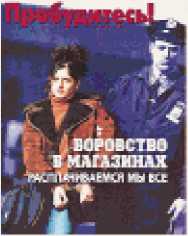

Jehovah’s Witnesses have published books on this subject, including The Secret of Family Happiness. The Watchtower and Awake! magazines have also devoted numerous pages to considering how to succeed in marriage. The unique problems facing single-parent families and stepfamilies have also been addressed. Many readers have expressed their appreciation for the timely articles on marriage and family life. Helpful information on this subject includes:
“Is Divorce the Answer?” (Awake! September 8, 2004) “How Can I Cope With the Challenges of Being an Adopted Child?” (Awake! May 22, 2003)
“Fatherless Families—Breaking the Cycle” (Awake! February 8, 2000)
“The Family—A Human Necessity!”
(The Watchtower, April 1, 1998)

IprfynHTecb!
AfiKorojih Hl pi L 4THCM
The Watchtower and Awake! magazines have featured articles on alcoholism. These have offered specific suggestions to help individuals break free from alcohol’s destructive grip and to help family members understand the nature of alcoholism and its effect on the family. Helpful articles on this subject include:
“Breaking the Chains of Alcohol Abuse”
(Awake! October 8, 2005)
“Succeeding in the Struggle With Alcoholism”
(The Watchtower, August 15, 1993)
“How Can I Stop Drinking?”
(Awake! January 22, 1993)
“An Alcoholic Parent—How Can I Cope?”
(Awake! August 8, 1992)
“Help for Adult Children of Alcoholics”
(Awake! May 22, 1992)
-
• Children, Guidance and Protection for The books Questions Young People Ask—Answers That Work, volumes 1 and 2, provide sound guidance for youths. Awake! carries a “Young People Ask” series that addresses problems common to youth. Helpful Watchtower and Awake! information aboutchildren includes:
“Parents—Be a Fine Example for Your Children”
(The Watchtower, April 1, 2006)
“Does God Really Care About Children?” (Awake! August 8, 2004)
“Teen Pregnancy—A Global Tragedy”
(Awake! October 8, 2004)
“Children in Crisis—Who Will Protect Them?”
(Awake! April 8, 1999)
“Sexual Exploitation of Children—A Worldwide Problem” (Awake! April 8, 1997)
A Brief History of Jehovah’s Witnesses in Russia
| 1887 Watch Tower publications are mailed to interested ones in Russia
11891 Semyon Kozlitsky is exiled to Siberia for preach
ing the Bible in Moscow
1891 C. T. Russell—who was taking the lead among the Bible Students, as Jehovah’s Witnesses were then known—visits Russia and other locations in Eastern Europe

Publications in Russian dating from 1920-1930
1904-1927 Bible study groups and congregations are formed in various parts of Russia
1928 A representative of the Bible Students in Moscow seeks approval to print Bible literature
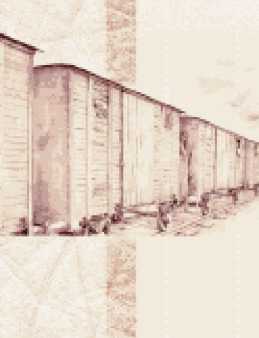
1949 Jehovah’s Witnesses file a petition for legal recognition with the Ministry of the Interior of the USSR in Moscow
1951 Many of Jehovah’s Witnesses from western Ukraine, Belarus, Bessarabia, Moldova, Latvia, Lithuania, and Estonia are arrested and exiled to remote districts of the country. Later, Witnesses are actively spreading the good news beyond the Urals, in Kazakhstan, and in the Far East, on Sakhalin and Kamchatka
1956 More than 17,000 are regularly attending the meetings of Jehovah’s Witnesses
1956-1957 At 199 conventions held worldwide, a total of 462,936 support a petition requesting religious freedom for Jehovah’s Witnesses in the USSR
1989-1990 Thousands of delegates from Russia attend conventions in Poland
1991 On March 27, Jehovah’s Witnesses receive legal recognition in the USSR
1992 On December 11, Jehovah’s Witnesses are registered in the Russian Federation
1992-1993 International
conventions of Jehovah’s Witnesses are held in St. Peters
burg and Moscow
1996 On March 14, Jehovah’s
Witnesses are fully exonerated by a Russian Federation Presidential Decree (No. 378) as victims of political repression
1999 On April 29, the religious organization “Administrative Center of Jehovah’s Witnesses in Russia” was reregistered under currentreligious law
2008 More than 2,200 congregations and groups of Jehovah’s Witnesses and over 400 legally registered local religious organizations are active in Russia

1890 1910 1930

1950 1970 1990

-
• BIBLE: Jehovah’s Witnesses believe that the entire Bible is the inspired Word of God. Instead of adhering to a creed based on human tradition, they hold to the Bible as the standard for all their beliefs. —2 Timothy 3:16,17.
-
• GOD: There is only one true God. He is supreme, the Creator of the heavens and the earth. His name is Jehovah.—Exodus 15:3;Psalm 83:18.
-
• JESUS CHRIST: Jesus Christ is the Son of God. He came to earth from heaven and laid down his perfect human life as a ransom sacrifice. His death and resurrection make salvation and eternal life possible for those exercising faith in him. As King of God’s Kingdom, Jesus will rule from the heavens over an earth restored to righteousness and peace.—John 3: 16;Revelation 11:15.
-
• NEUTRALITY: Jehovah’s Witnesses do not interfere with the efforts of the nations to raise armies and defend themselves. However, Jehovah’s Witnesses believe that they must individually ‘beat their swords into plowshares and learn war no more.’ (Isaiah 2:3, 4) Accordingly, they do not fight in the wars of nations or take sides in partisan affairs. (John 17:16) Their stand is well documented in history and can be traced to the example of the first-century Christians. At the same time, Jehovah’s Witnesses never interfere with what others choose to do.
-
• GOOD CITIZENSHIP: Jehovah’s Witnesses obey the laws of the government and conscientiously pay their taxes. (Romans 13:1, 7) Additionally, their publications and public ministry encourage everyone to be law-abiding. They are not a cult or a sect. They do not isolate themselves from the rest of society. They do not follow a human leader; their Leader is Jesus Christ. In order to become Jehovah’s Witnesses, many among them overcame such harmful practices as stealing and the abuse of drugs and alcohol.
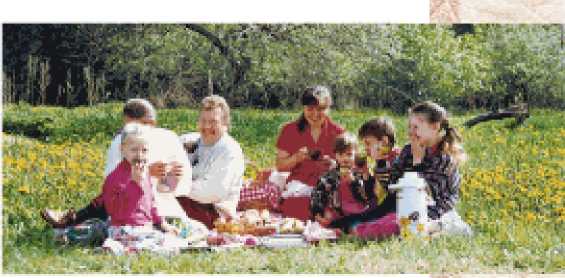
-
• FAMILY LIFE: Jehovah’s Witnesses highly regard family life and follow the Biblical commands that husbands love their wives, wives respect their husbands, and children obey their parents. (Ephesians 5:21-6:3) They are very interested in the well-being of their children and try to raise them to become worthwhile members of society.
-
• HEALTH: Jehovah’s Witnesses desire long and healthy lives. For this reason they do not smoke or abuse drugs. They may use alcoholic beverages in moderation, but they shun drunkenness. They do not practice abortion or engage in sexual relations outside of marriage. Jehovah’s Witnesses seek to obtain the best medical care available for themselves and their children. They obey the Bible’s command to “abstain . . . from blood” and thus avoid the hazards and often fatal complications arising from transfusion of another person’s blood.—Acts 15:20, 28, 29.
-
• FINANCIAL SUPPORT: The work of Jehovah’s Witnesses in Russia is sustained by voluntary contributions of fellow believers, who fully support the work. —2 Corinthians 9:7.
-
• MINISTRY: All of Jehovah’s Witnesses talk to others about Jehovah, and they follow Jesus’ command to “make disciples.” (Matthew 28:19, 20) All their ministerial activity is done on a volunteer basis, and Jehovah’s Witnesses have no paid clergy.
What Others Say About Jehovah’s Witnesses
Jehovah’s Witnesses realize that not everyone agrees with their explanation or application of the Scriptures. Since we live in a pluralistic society, tolerance of differences in lifestyles, ethnic backgrounds, and religious beliefs makes for peace. Many journalists, judges, and others have commented on the fine spirit and positive contributions that Jehovah’s Witnesses have made to the communities in which they live. The following are but a sample.
In his book Jehovah’s Witnesses—A Traditionally Russian Religious Organization, Dr. Sergei Ivanenko, a Russian religion scholar, says this about Jehovah’s Witnesses: “Their religious organization has had members on Russian territory for over a hundred years, and in many cases believers who profess the religious teachings of Jehovah’s Witnesses are second-, third-, or even fourth-generation members. In any case, from an analysis of the . . . facts characterizing the role and place of the religious organization of Jehovah’s Witnesses in Russian history from the Great Patriotic War, it may be concluded that this religious organization has become one of the visible components of the religious life of the former USSR and Russia and also that affiliation with the religious organization of Jehovah’s Witnesses, including that spread over several generations, does not mean the loss of national self-awareness and cultural identification by its believers.”
In his work Russian Jehovah’s Witnesses: History and Present, Academician N. S. Gordienko, professor of religious studies, writes: “Although the association of Jehovah’s Witnesses is an international organization, whose Governing Body is located in the U.S.A., it does not import into Russia a strange, ‘foreign’ spirituality, but fulfills the spiritual needs of Russians, helping them in the context of religion to solve problems of a social, ideological, or simply everyday nature.
“The organization of Jehovah’s Witnesses does not pretend to have a dominant position among Russia’s religions. Its members belong to a religious minority and do not count on anything more, neither now nor in the future. They occupy their own niche in the spiritual life of believers among the citizens of the Russian Federation, giving a certain sector of Russians that which they do not receive from other religious and secular ideological systems.
“Jehovah’s Witnesses are loyal citizens of Russia, who are invariably law-abiding and obedient to authorities and have high morals and a healthful lifestyle—all of which serve the basic interests of individuals and society. They strive to be friendly not only toward fellow believers but also toward all other citizens. ...
“The association of Jehovah’s Witnesses is a normal religious organization, and in the spirit of the constitutional guarantee of the freedom of conscience, it should be treated just as tolerantly as other confessions and denominations legally existing in Russia and acting within the ramifications of the Constitution of the Russian Federation.”
Lyudmila Alekseeva, chairman of the Moscow Helsinki Group, stated: “As a result of pressure from Soviet authorities, I had to immigrate to the U.S.A., where from 1979 to 1986, I lived in the small town of Tarrytown, New York. On one of the streets in my neighborhood, there were churches of many confessions: Catholic, Baptist, Methodist, and a Kingdom Hall of Jehovah’s Witnesses. All the believers lived peaceably with one another, there were no conflicts between them, and externally (according to the way they dressed and conducted themselves), there was no great difference between them.
“Some of my neighbors were Jehovah’s Witnesses. They were pleasant, cultured people, who did not engage in aggressive behavior. When Jehovah’s Witnesses preached and called at my door, I always answered that I was Orthodox and would not discuss religious beliefs with them. They left peacefully, and we had no arguments.
“In 1993, I returned to Russia, and while I was engaged in legal defense activities, I became acquainted with Jehovah’s Witnesses in our country (they appealed to the Moscow Helsinki Group about the violation of their rights). Russian Jehovah’s Witnesses made a good impression on me. They are able to remain calm and keep their dignity even in an atmosphere of hostility, which is sometimes stirred up against them and influences authorities and members of society. Usually people who are confronted with injustice and loss of their legal rights become nervous, irritable, and angry. This did not happen to Jehovah’s Witnesses who turned to the Moscow Helsinki Group. Most likely they have... developed their own kind of stoicism, considering that they are suffering for their loyalty to Christ and must rely on both their own strength and God’s help to fulfill their mission without despair.”
In the book Religions of the Nations of Modern Russia, released under the editorship of Miran Petrovich Mchedlov, Chairman of the Expert Council for Conducting State Expert Religious Studies With the Ministry of Justice of the Russian Federation, the following is noted: “The Authorities are considered by Jehovah’s Witnesses as an arrangement that is permitted to exist by God. They do not take part in conflicts with the law. They respect order and obedience to the law.”—Italics ours; 1999, page 463.
Commenting on the history of Jehovah’s Witnesses, a July 2008 ruling of the
“Jehovah’s Witnesses are loyal citizens of Russia, who are invariably law-abiding and obedient to authorities and have high morals and a healthful lifestyle—all of which serve the basic interests of individuals and society. They strive to be friendly not only toward fellow believers but also toward all other citizens.”
—Professor N. S. Gordienko European Court of Human Rights upholding religious freedom, stated that Jehovah’s Witnesses are “long established” and are among “religious groups with a long-standing existence internationally.”—Case of Religions-gemeinschaft Der Zeugen Jehovas and Others v. Austria, (Application No. 40825/98).
On November 5, 1996, Professor Dr. h.c. Karel Dobbelaere, a member of the Belgian Royal Academy, wrote that Jehovah’s Witnesses are a worldwide established religion. His document was notarized on November 12, 1996, by the Apostille of the Belgium Minister of Foreign Affairs. It states:
“For about 20 years, I have observed the Christian Congregation of Jehovah’s Witnesses. In 1976, I... conducted a survey with professor Bryan R. Wilson from All Souls College, Oxford, to study the social aspects of that religious minority in Belgium ... I can say that Jehovah’s Witnesses are people issued from every social stratum. Their children attend public schools and universities. They are not sectarian. Their religion is established world-wide.
“I can add that Jehovah’s Witnesses cooperate closely with the medical staff and that they love their children. If a blood transfusion is prescribed, they request an alternative treatment out of respect for their convictions. In many large hospitals, effective techniques have been developed to accommodate them.”
Concerning an assembly of Jehovah’s Witnesses, the Greek magazine ENA noted: “As we saw them praying, we were impressed by their peaceable attitude. The presence of the police was limited to only a few men....
These are people with strong family ties, they are taught to love and to live by their conscience so as not to harm others.”—July 22, 1993, pages 114-116.
A deputy of the local parliament of the city of Luxembourg, Pierre Frieden, commented in a letter dated December 7, 1990:
“[Jehovah’s Witnesses] are typical of the men of our day who meet the demands of our modern society. Perhaps more than others, they demonstrate the union of higher morality with sincere loyalty toward our democratic institutions.
“To my knowledge, the representatives of the Watch Tower Society have always adhered to their resolve to perform no act that would not entirely and faithfully conform to the requirements of the law and the regulations of the City of Luxembourg.”
The premiere of the video documentary Jehovah’s Witnesses Stand Firm Against Nazi Assault was held at the Ravensbriick Memorial in Germany on November 6, 1996. Regarding the documentary, then Prime Minister Manfred Stolpe of the Federal State of Brandenburg wrote: “I would like to reassure you in writing that I greatly respect Jehovah’s Witnesses for resisting NationalSocialism courageously and for unselfishly assisting other inmates.. .. The presentation of your video is an important step toward informing the public about the role of your religious group under the NS-regime. For sure it would be very appropriate to have the video included in the educational program of the Memorials in Ravensbruick and Sachsenhausen and to have them always available for visitors.”
As you can see, Jehovah’s Witnesses are an upright and well-established religion, whose members have contributed much to the well-being of their neighborhoods and to peaceful relations among the people in their communities. Their resoluteness in upholding the high moral standards of the Bible and their love of neighbor, as expressed especially in their Bible education, have had a wholesome effect in all countries where they exist. At times they have been misunderstood, as this brief review of history shows. However, they have endured quietly under adversity, not allowing it to dampen their love of God and love of neighbor.
Although Jehovah’s Witnesses have often been the subject of criticism and sometimes the object of ridicule and scorn, the same was true of the Christian congregation when it was founded by Jesus Christ in the first century. For instance, opposers spoke of the apostle Paul as “a pestilent fellow,” and called the Christians associated with him a “sect.” (Acts 24:5; 28:22) Jehovah’s Witnesses try their best to seek God’s approval, which they regard as being of higher value than the approval of fellow men. We agree with the first-century lawyer Gamaliel, who said of the early Christian preaching activity: “If it is from God, you will not be able to overthrow them.” (Acts 5:39) We trust that all sincere and honesthearted people of Russia will be convinced of the uprightness of Jehovah’s Witnesses and conclude that they are law-abiding citizens.
It is hoped that this brochure will be accepted as an expression of our sincere desire to inform the authorities and honesthearted people firsthand of the Christian activity of Jehovah’s Witnesses in doing the will of God in Russia.
Sincerely,
Jehovah’s Witnesses in Russia
© Religious organization “Administrative Center of Jehovah’s Witnesses in Russia”, 2008
Jehovah’s Witnesses in Russia English (pb-E Ru)
Publishers
Jehovas Zeugen in Deutschland, 12 557 Berlin, Grunauer Str. 104
Made in Finland, 2008
The brochure Jehovah’s Witnesses in Russia is provided as part of a worldwide Bible educational work supported by voluntary donations.
Picture credits: Cover, top: © Jose* Fuste Raga/age fotostock; bottom: Albert Georgievich Stepanov; pages 8-9, earth: NASA JSC